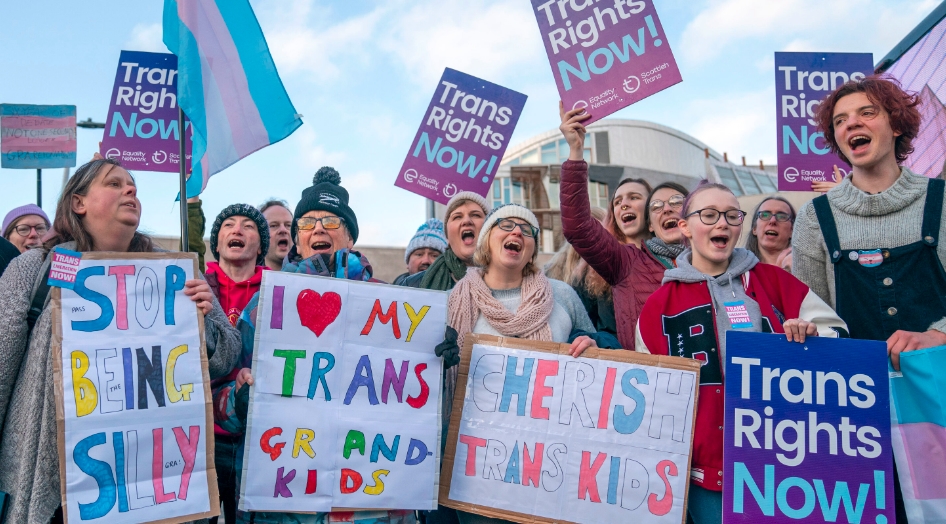The Scottish Parliament passed the Gender Recognition Reform (Scotland) Bill on 11 December 2023, aiming to make it easier for trans people to change their legal gender. However, the UK Government used its power under section 35 of the Scotland Act 1998 to prevent the bill from receiving royal assent, the first time this power has been used. This decision sparked outrage among LGBT+ groups, human rights activists, and pro-independence supporters, who accused the UK Government of undermining Scotland’s devolution and democracy.
What is the Gender Recognition Reform (Scotland) Bill?
The bill seeks to amend the Gender Recognition Act 2004, which applies to the whole of the UK. The current law requires trans people to provide evidence of a diagnosis of gender dysphoria, live in their acquired gender for two years, and make a statutory declaration that they intend to live in that gender until death, in order to obtain a gender recognition certificate (GRC). The GRC allows trans people to change the sex on their birth certificate, which affects their legal rights and status in various areas, such as marriage, pensions, and inheritance.
The bill proposes to simplify the process by removing the medical and evidential requirements, and reducing the living period to three months. It also introduces a three-month reflection period before the GRC is issued. The bill aims to make the process more accessible, respectful, and dignified for trans people, who often face discrimination, harassment, and violence because of their gender identity.
The bill follows two public consultations by the Scottish Government, which found majority support for the reform. The bill also received cross-party backing in the Scottish Parliament, with only the Scottish Conservatives voting against it. The bill is in line with the international human rights standards and best practices, as recommended by the European Commission, the Council of Europe, and the United Nations.
Why did the UK Government block the bill?
The UK Government claimed that the bill would have implications for reserved matters, such as immigration, social security, and data protection, and that the Scottish Government did not consult with them adequately on the bill. The UK Government also argued that the bill would create legal inconsistencies and confusion across the UK, as different gender recognition laws would apply in Scotland and the rest of the UK.

The UK Government invoked section 35 of the Scotland Act 1998, which allows the Secretary of State to prevent a Scottish bill from receiving royal assent if they think that the bill is outside the legislative competence of the Scottish Parliament, or is incompatible with the European Convention on Human Rights or EU law. The Secretary of State must notify the Presiding Officer of the Scottish Parliament of their decision within four weeks of the bill being passed.
The UK Government’s decision was challenged by the Scottish Government in the Court of Session, Scotland’s highest civil court. However, the court ruled in favour of the UK Government on 10 January 2024, stating that the Secretary of State acted lawfully and reasonably in using section 35. The court also said that the Scottish Parliament did not have the power to legislate on gender recognition, as it was a reserved matter under the Scotland Act 1998.
What are the reactions to the decision?
The decision was met with anger and disappointment by LGBT+ groups, human rights activists, and pro-independence supporters, who denounced the UK Government’s interference in Scotland’s devolution and democracy. They also expressed concern for the welfare and rights of trans people in Scotland, who have been waiting for years for the reform.
The Scottish Government said that it was deeply disappointed by the decision, and that it would appeal to the Supreme Court, the UK’s highest court. The Scottish Government also said that it remained committed to improving the lives and rights of trans people in Scotland, and that it would explore other ways to achieve that goal.
The Scottish Greens, who formed a power-sharing agreement with the SNP in August 2023, said that the decision was a clear violation of Scotland’s devolution settlement, and that it showed the need for Scotland to become an independent country. The Scottish Greens also said that they would continue to support the reform and stand with the trans community.
The Scottish Labour, who supported the bill in the Scottish Parliament, said that the decision was a setback for trans rights and equality, and that they would urge the UK Government to reconsider its position. The Scottish Labour also said that they would work with the Scottish Government and other parties to find a way forward for the reform.
The Scottish Conservatives, who opposed the bill in the Scottish Parliament, said that the decision was a victory for common sense and the rule of law, and that it protected the integrity of the UK. The Scottish Conservatives also said that the bill was flawed and divisive, and that it ignored the concerns of women’s groups, faith groups, and medical professionals.


















